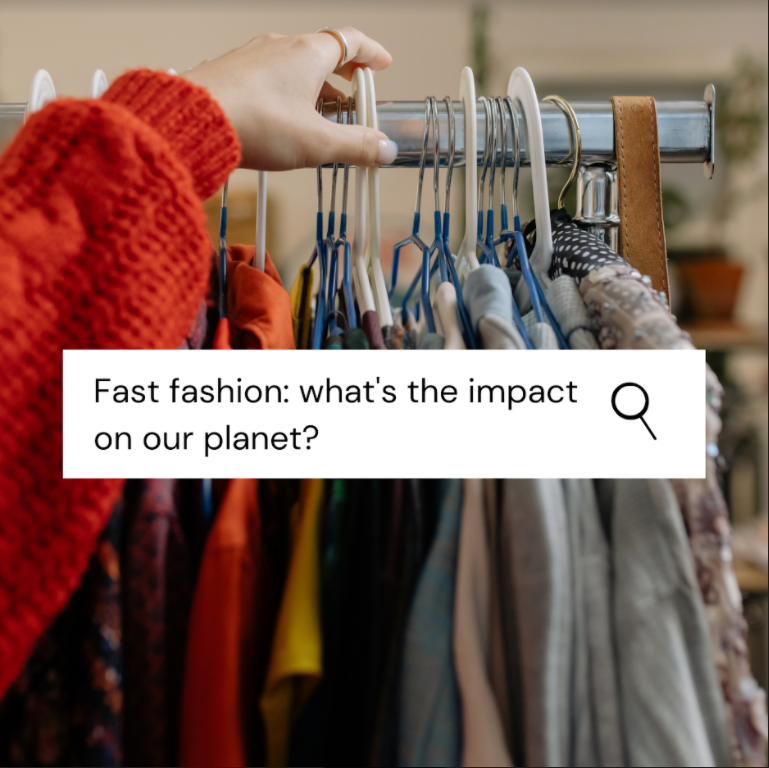
Technology has fundamentally changed the way we shop. We have more time to endlessly browse through new arrivals, and the promise of next-day shipping and discount codes can make it hard to resist.
For many, it’s been a comfort, the anticipation of an incoming parcel breaking up the monotony of another week in lockdown. In the last four months of 2020, ASOS and Boohoo saw a sales increase of 40 percent and its showing no signs of slowing down.
But it’s easy to forget just how destructive fast fashion really is. The UNEP reported that the fashion industry is responsible for 10 percent of annual global carbon emissions. Just for context – that’s more than all international flights and maritime shipping put together.
If we carry on buying at the rate we do now, the industry’s greenhouse gas emissions will surge more than 50 percent by 2030.
This pace of purchasing is simply unsustainable. The average person today buys 60 percent more clothing than they did in 2000 and keeps it for half as long. The more we buy, the more we waste – in the UK we send 350,000 tonnes of wearable clothing to landfill every year.
We also cannot ignore the human cost of fast fashion, which affects not only countries far off our shores but here in the UK as well. In Leicester, there are currently a feared 10,000 garment workers trapped in modern slavery.
So what can we do?
2021 is the year to officially breakup with fast fashion. Delete the apps, unsubscribe from marketing emails and avoid browsing online when you’re bored.
Top 5 tips to avoid fast fashion:
- Support independent businesses
Instagram is a great tool to find small businesses that produce sustainable and ethically made fashion. By purchasing from a small business, you are supporting individual talent and putting your money towards a transparent supply chain – where everyone is paid fairly and steps have been taken to mitigate carbon emissions.
There are hundreds to explore, here’s some we recommend:
Lucy and Yak – launched in 2017 by husband and wife duo, Lucy and Chris in 2017, this Brighton-based business is now infamous for its signature dungarees that are available in a rainbow of colours, as well as limited edition collaborations with local artists.
Peachy Den – Instagram’s ‘it’ brand of the moment, Peachy Den is committed to slow fashion and sustainably producing garments with a small team in London. It’s 70s inspired velvet jumpsuits have been featured in Vogue, Elle and Stylist.
Grey Milk – Every single item is handmade by Gwen at her home studio in Manchester. Her seasonal lines sell-out so you have to act quick if you want to snap up a piece!
Maggie Cross Jewellery – Yep, even jewellery can be sustainable too! Maggie handmakes everything in her studio in West Wales using recycled precious metals. Her recent collaboration with illustrator Bobbi Rae has been particularly popular, featuring cheeky fruit and floral characters.
House of Sunny – In response to the constant new releases from fast fashion brands, this East-London brand produce just two small seasonal drops a year, focusing on sustainable fabrics and manufacturing methods. - Buy less but buy better
No one is suggesting you can never buy anything from Zara again and its unrealistic to pretend that you will never need a basic pair of leggings from Primark. It’s all about making changes where possible. Instead of mindlessly filling your basket with spontaneous purchases every other week, think about what you will still want to wear years down the line. The most sustainable way to shop is simply to do it less.
When you do need to buy something new, it’s always better to invest in durability instead of buying poor quality items that are destined for landfill months after the tags are pulled off. - Embrace vintage and second hand
Apps like Depop have boomed in the last few years and it’s easy to see why – like the cooler, younger sister to eBay, you can find pre-loved and vintage items in the same way you scroll through Instagram. Pre-loved clothing no longer conjures up the image of charity shop rejects, you can find current season items (usually still with tags on) and one-of-a-kind vintage at the tip of your fingers. - Do your research!
Many brands have been exposed for greenwashing with ‘sustainable’ product lines that are anything but, and dubious claims about who actually produces their items. If something seems too good to be true – it usually is. If a brand releases a conscious collection without any facts or figures to back it up, it’s probably not as ethical as it looks.
Most brands will have a sustainability section of their website, its up to you to make sure you’re doing your research before making a purchase. - Always recycle
When clothes do come to the end of their lives – don’t just throw them away. 57 percent of all discarded clothing ends up in landfill, releasing microplastics and polluting waste streams.
To minimise waste, where possible, find other uses for the fabric, or donate the item to charity. Best of all, find local textile recycling hubs that will separate materials to be reused or recycled and export usable items to developing countries.
More information can be found here in the EcoWatch Fast Fashion Guide.
